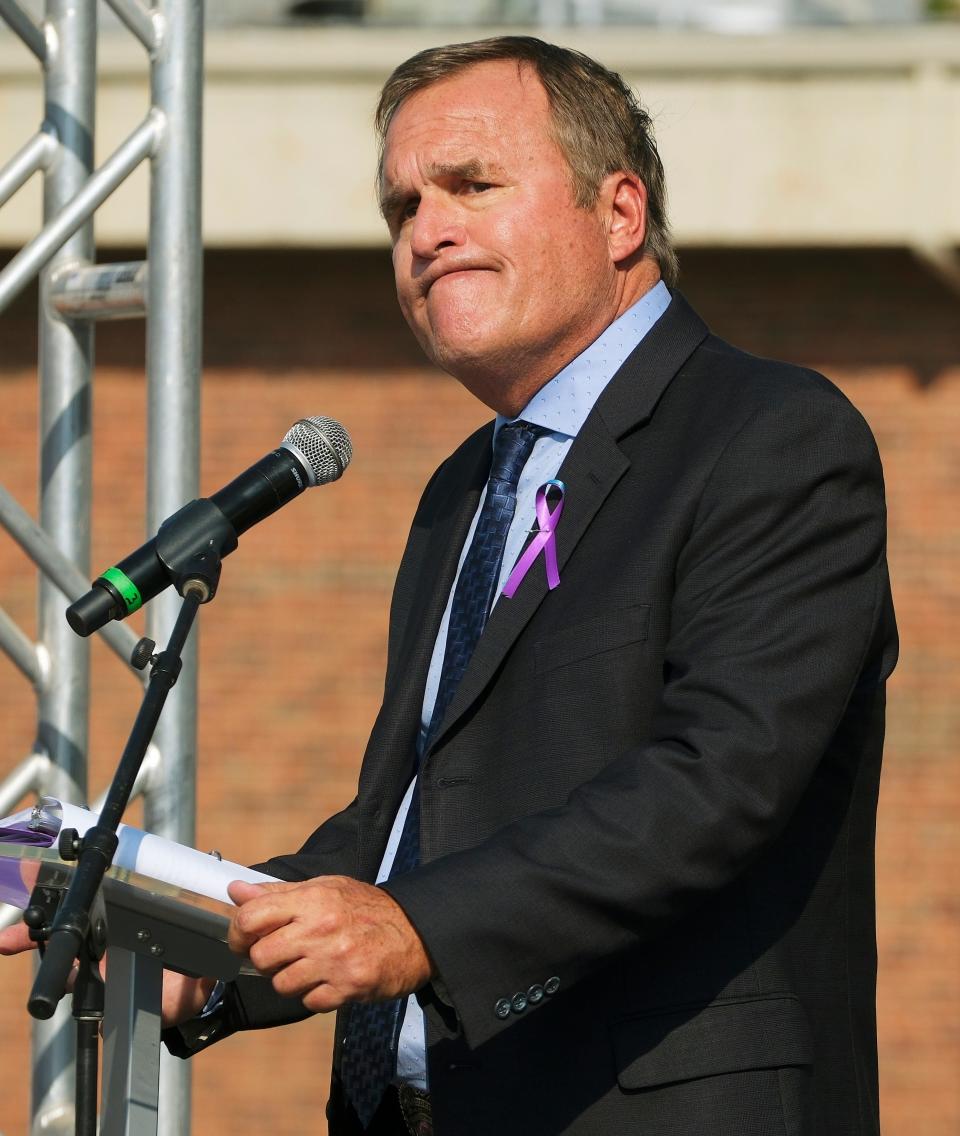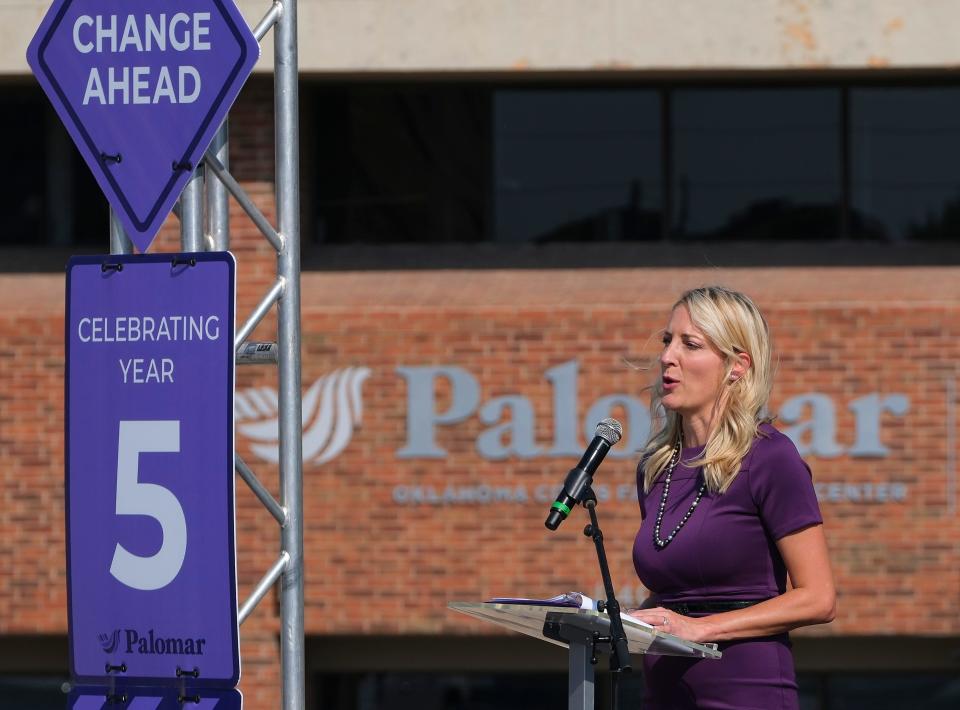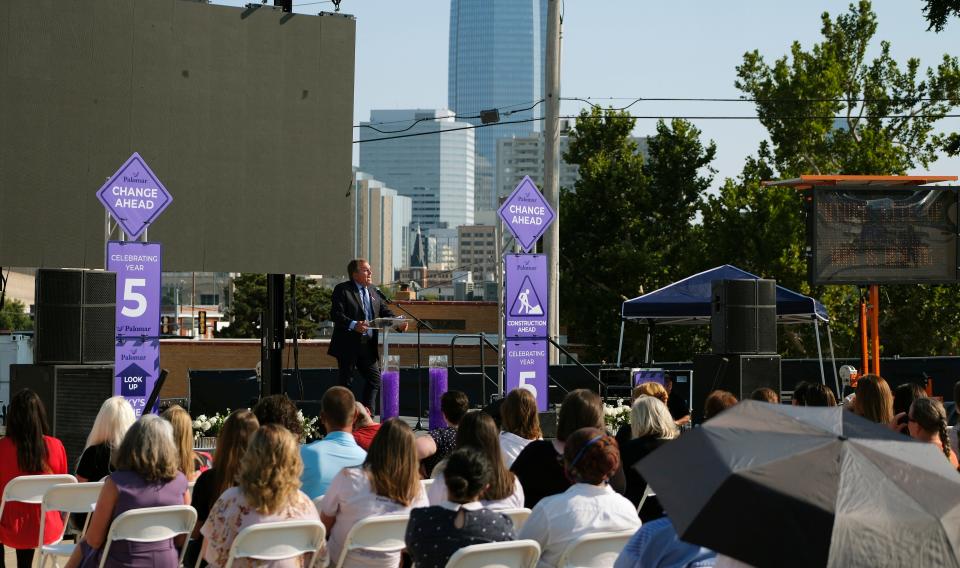Amid COVID-era surge in abuse, new domestic violence center details announced in OKC
When 38-year-old Natalie Seiden discovered she was pregnant in late 2020 with her second child, she was already in a seemingly endless cycle of violence that had brought her to the lowest point of her life. She said her health became a serious concern as the abuse intensified, and after the Oklahoma Department of Human Services intervened, Seiden and her first daughter found themselves displaced from their home.
"I wanted to do better for my family," Seiden said. "Things hadn't gotten better after (my first daughter) was born, and the way things were going so early in my pregnancy with my second daughter, I knew they weren't going to be safe, that I wasn't going to be safe. I had to put my daughters first."
Seiden is one of thousands of Oklahomans every year who experience domestic violence. The state historically has one of the highest rates of domestic abuse in the nation, and in 2020 Oklahoma saw one of the deadliest years on record for victims of domestic violence.
Seiden's journey took her through several instances of homelessness as she struggled to secure affordable housing for her and her daughters. Issues compounded by the pandemic slowed the process, but she finally moved into a new apartment in March.
"I have not been this happy in a really long time," said Seiden, whose children are safely in daycare as she pursues a respiratory therapist degree at Rose State College. "I feel like Natalie again, which is what (my abuser) took away from me, and now I'm Natalie as a momma. It gets better every day, and I really owe a lot of that to Palomar."

Palomar is an Oklahoma City nonprofit that provides services and resources to victims of domestic violence, sexual assault, stalking, human trafficking, and child and elder abuse. Through some of its 42 community agency partners, Palomar helped Seiden acquire an apartment voucher and furnish her apartment with donated, lightly used furniture and assisted her with counseling for post-traumatic stress.
"We now have a beautiful home that's safe," Seiden said. "They have all of these different connections and resources that have really changed my life."
More:Family justice center makes pitch for MAPS 4 inclusion
Palomar celebrated its fifth anniversary on Tuesday at an outdoors midtown Oklahoma City ceremony attended by more than 200 people. As the event progressed, Palomar announced a new Family Justice Center will be built across the street from its current location at 1140 N Hudson Ave.
The new building is being funded by the city as fulfillment of a 2019 effort to invest $38 million into a permanent facility through the MAPS 4 program. Officials said the larger space will serve as an official headquarters for the many agency partners working with Palomar. The nonprofit's leaders told The Oklahoman it plans to break ground in early 2024 in what is currently the parking lot, with construction set to finish by 2025.
"We are no longer 'the little building that could,'" Palomar founder Kim Garrett said as she emceed the ceremony. "Where we stand today is not a footprint for a bigger and better building. It is the legacy of transformational change."

Domestic violence surged to highest in a decade during the pandemic
Domestic violence and abuse in Oklahoma is endemic. Nearly half of women in Oklahoma experience intimate partner violence at some point in their life — the highest rate in the United States, according to data from the National Intimate Partner and Sexual Violence Survey. Statistics also show 40% of men also are victims of domestic violence.
"We've seen everything from a newborn up to a 97-year-old man," Garrett told The Oklahoman. "Domestic violence does not discriminate, and men are less likely to reach out for help and services, but they're certainly not less needing of services and support."
In 2020, during the pandemic's peak, domestic violence-related homicides in the Oklahoma City metro reached a 10-year high, mirroring a trend of increased domestic violence calls and arrests across the country. Last year, Oklahoma City police responded to more than 39,000 domestic-related calls.
In Oklahoma County alone, for which Oklahoma City is the county seat, the Oklahoma State Bureau of Investigation reported 5,135 domestic violence crimes in 2020. The Domestic Violence Fatality Review Board, a program under the Oklahoma attorney general's office, identified 29 domestic violence-related deaths — nearly double the number of such deaths from the previous year — while OSBI reported 18 murders.
Disparities in racial demographics are also stark. Black women are the most disproportionately represented in domestic violence reports, followed by women of Indigenous descent, according to the Domestic Violence Fatality Review Board.
Victim and Perpetrator Race
Infogram
"We, unfortunately, in Oklahoma City and Oklahoma have a very high domestic violence rate, and the only way to stop that is to talk about it," Oklahoma City Mayor Holt said. "But we knew this community needed to do more. We weren't moving those numbers."
Palomar's Family Justice Center grew as an extension out of local police efforts to increase public safety and accountability for violent offenders by bringing agencies together to assist victims.
"Our services are always client-centered, which means that somebody may come in and want a full array of services, like wanting criminal charges pressed or cooperate with prosecution, things like that," Garrett said. "If that's what they choose, we support them. But somebody else might come in and say, 'I just want therapy,' or, 'I just need help getting a divorce,' and we embrace them. And I think that's something that's really unique about our model, is that there's no cookie-cutter approach. Each person is an individual and brings in something so unique, and so their healing is also going to be unique for them."
Susan Stewart, a manager at Family Builders, another nonprofit dedicated to ending the cycle of abuse, said "it's just astonishing" to compare Palomar now to what it was then.
"Family Builders was one of the first partners with Palomar five years ago," Stewart said. "It's just grown exponentially in the number of clients they serve, the number of calls they respond to."
Since its inception, Palomar has provided nearly 207,000 services to more than 17,000 clients and spearheaded numerous initiatives for healing and hope throughout the state. What started out as 15 partner agencies expanded to 42 today.
"We give people that come to us the toolbox of skills, like healthy discipline as opposed to punishment," Stewart said of Family Builders' 52-week Batterers Intervention Program. "Almost all of the guys that we see through that Batterers Program have high Adverse Childhood Experience (test) scores for trauma, so we want to increase the level of accountability on abusers and break that abusive cycle so that we can have adults out here with healthy relationships."
What is trauma?:Experts weigh definitions, symptoms and healing
Garrett remembered, before Palomar even officially opened its doors or began advertising, several people would walk up, banging on the door.
"There was such a huge demand for our services, I remember legal aid attorneys were on the floor, helping people sort their legal paperwork and file them," Garrett said. "It was just a huge realization that this was such a needed collaborative in our community, that there's a lot of families that are hurting and desperate for help."
The willingness to openly discuss rough experiences, experts agree, is important in reducing the stigma surrounding abuse and encouraging people to seek help.
"The change you make in these lives, especially the children, is planting these seeds for the future," Holt said. "Here at Palomar, they're saving lives today."

Skeptics telling abuse victims to 'just get over it' misunderstand trauma
Marlene White, 43, also knows this firsthand. She sought Palomar's legal aid services for what she said was abuse of her children, an experience that turned White into a fierce advocate for children's rights.
"You can't unsee a child's agony, a child's anger," White said. "It's not something you can make up. And I'd seen a lot of documentaries and heard so many stories about abuse and I always told myself, 'That'll never be my kids.' But then, one day, I realized it was."
White was brought to tears during an interview with The Oklahoman as she remembered how positively affected her children were after they attended Palomar's second annual Camp HOPE, a summer mentoring program for trauma-exposed children, five years ago. Her children came home with awards for attributes like courage and determination — qualities they had long doubted in themselves because of the traumatic experiences they'd suffered, White said.
"It was like they were speaking life into my kids and reminding them of the good that they still had in them and the good that they had in their futures," White said. "My kids say that was their favorite part. They either put them up on the walls or still keep them in their drawers, and you know how powerful that was. At Camp HOPE, they felt valued, they felt heard."
White said most of her children have adjusted well in the years since, but she fears some of the trauma might last for years longer. She is grateful for the Palomar services but believes more could be done to help provide long-term services for children impacted by domestic violence, as she's seen some of her children recover at different speeds than others.

Garrett, who served as CEO of Palomar until earlier this year, also conceded there was still more work to be done, pointing to a Family Justice Center in Nashville, Tennessee, as the facility Oklahoma City's hopes to closely emulate.
The MAPS 4 financial backing will help the department agencies and some of the community partners move their full operations onsite and not pay rent. Most of the money will go toward providing expanded programming and services, Garrett said, and the $38 million is not a "blank check."
'They are not alone':Hispanic domestic abuse survivors speak out to help other victims
Past, present and future work includes dispelling persistent skepticism about the severe scale of domestic abuse amid a growing backlash against advocacy in the wake of the #MeToo movement.
"One of the biggest barriers that we've faced is systemic denial of the magnitude and the frequency of domestic violence," Garrett said. "But something that I think has been very helpful for me in this journey of educating the public is showing a map of the calls that are domestic-related. And when you see the map and people are like, 'Wow, it's in Quail Creek, and it's in this nice neighborhood and it's in this not-so-nice neighborhood,' that's when they realize it's everywhere, and it's really powerful."
More:In OKC, young adults try to make sense of the #MeToo moment
Another common misconception is that the nonprofit only offers women services, but Garrett said nearly half of Palomar's clients are men.
"We provide men with the same resources, opportunities and access that we would a female survivor," Garrett said. "I've worked with survivors for years, and I feel like working with male survivors is actually even tougher, because there's so much shame coming from the idea of 'I should've protected myself. How did I let this happen?' I think there's more of a complicated trauma in a lot of ways, and I have a lot of empathy for men who are going through abuse."

Casey Gwinn, president of the California-based Alliance for HOPE International, is a male survivor of abuse, telling Tuesday's midtown audience that the confusion and betrayal victims feel will typically manifest into anger at authority figures if it is not properly remedied. He encouraged listeners to "step up" to the task of substantive criminal justice reform that "keeps people out of prison and jail to begin with" and rises above partisan divides.
"You're almost to the starting line of this next chapter," Gwinn said. "You're not at the finish line."
On a personal level, Seiden agrees.
"I believe that all of these resources from Palomar are not meant for you to live on for the rest of your life — I believe they are meant to build you up and help you succeed," Seiden said. "I want my story to be an inspiration for others, because you can get out. You don't have to live like that. Even if you have kids, you're not trapped."
If you are suffering from domestic violence and wish to receive help, call 405-552-1010 or visit https://palomarokc.org/.
This article originally appeared on Oklahoman: Domestic abuse center announces new OKC building amid violence surge

